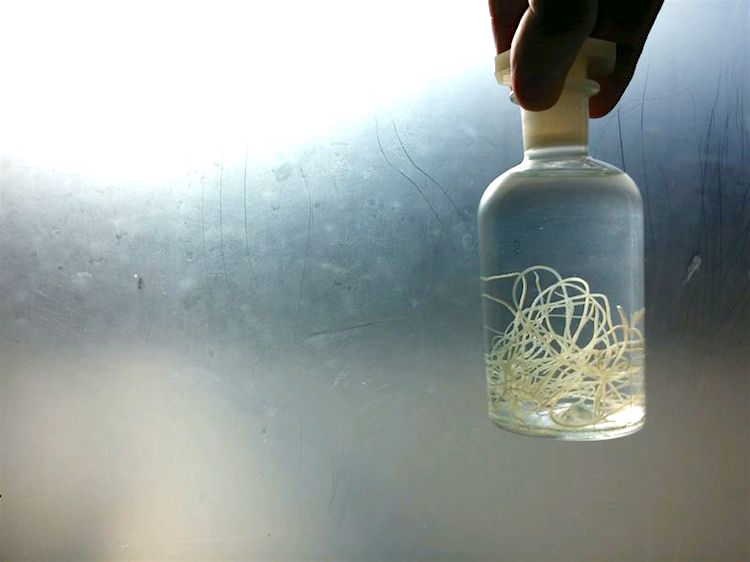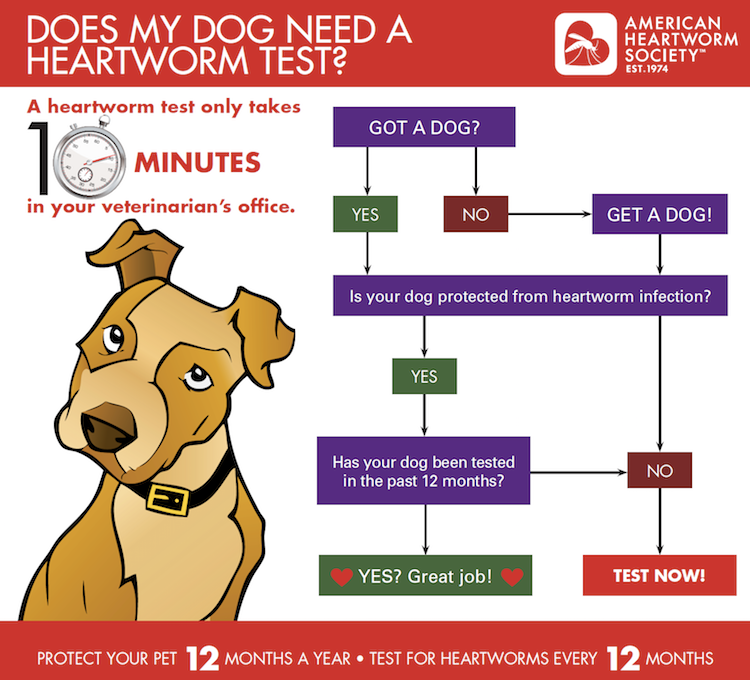
This pet health content was written by a team of writers including Dr. Debora Lichtenberg, VMD. It was reviewed for accuracy by Dr. Pippa Elliott, BVMS, MRCVS, and was last reviewed and updated on June 10, 2024
If you have questions or concerns, call your vet, who is best equipped to ensure the health and well-being of your pet. This article is for informational purposes only and is not a substitute for professional medical advice, diagnosis, or treatment. See additional information.

Heartworm disease in dogs is a silent killer that is often overlooked until it’s too late.
This preventable condition starts with a mosquito bite and ends with either a long, expensive treatment or death.
Symptoms may not appear until the worm reaches maturity (usually after around 6 months).
7 Signs of Heartworm in Dogs
1. A soft, dry cough
The parasites make their way to the lungs and start multiplying in the lungs and surrounding veins.
Coughing may be most noticeable after exercise and may end with fainting. Even light exercise can cause fainting.
2. Inactivity or lethargy
Your pet suddenly seems tired more often, doesn’t want to go outside, or avoids all physical activity.
Dogs with heartworm infection are weakened and find it difficult to be active even when performing small tasks.
3. Weight loss or anorexia
Even minor physical activities, such as eating, can become difficult and exhausting chores.
4. Rapid or difficult breathing
Along with coughing, breathing problems occur when the worms inhabit the lungs and surrounding veins.
Fluid can also build around the blood vessels in the lungs, making it difficult for the lungs to oxygenate the blood.
5. Bulging chest
The ribs may seem to protrude, and the chest has a bulging appearance as a result of adult heartworm infection.
This symptom can result from weight loss and anorexia caused by heartworms. This can also be caused by fluid buildup in response to the parasite’s presence.
6. Allergic reaction
Although allergic reaction is more common in cats, it is possible for dogs to show symptoms similar to an allergic reaction or asthmatic symptoms in response to the heartworms or their offspring.
7. Collapse
Large numbers of heartworms invade the heart and cause blockage of blood flow (known as caval or vena cava syndrome).
Collapse is usually accompanied by shock and red blood cell destruction. Death can follow within days.

Other heartworm symptoms are possible, too:
- Nosebleeds
- Secondary pneumonia
- Increased blood pressure
- Excessive sleeping
- Seizures
- Blindness
- Lameness
Seizures, lameness and blindness occur when the parasites get lost and end up in places other than the heart or lungs. They can end up in the brain or eyes, although this is rare.
Some of the symptoms above can also be signs of other conditions, which makes it more difficult to detect heartworm infection.
There are other tools used by vets to detect the condition more accurately.
In the video below, Dr. Courtney Campbell, DVM, explains even more about the signs of heartworm in dogs:
Was YOUR Pet Food Recalled?
Check Now: Blue Buffalo • Science Diet • Purina • Wellness • 4health • Canine Carry Outs • Friskies • Taste of the Wild • See 200+ more brands…

Understanding Heartworm in Dogs
Diagnosis
Blood tests are the primary method to detect heartworm infection, which includes:
- Antigen Test: The most common test, checks for proteins produced by adult heartworms.
- Microscopic Examination: Views a blood sample to identify microfilariae (immature heartworms).
Additional tests include:
- Complete Blood Count (CBC): Checks for abnormalities indicating infection.
- X-rays: Detect inflammation, swelling, or enlargement in the heart, lungs, and pulmonary artery.
- Electrocardiogram (ECG): Identifies abnormal heart rhythms and enlarged heart chambers.
- Ultrasound (Echocardiography): Provides a visual of the heart to identify any existing heartworms and assess heart health.
These tests help determine if the dog is healthy enough for treatment.
Treatment
Treatment involves a multi-step process:
- Elimination of Adult Worms: This stage takes about one month. The dead worms are absorbed by the body.
- Eradication of Younger Parasites: Targets immature worms and offspring.
- Surgery (if necessary): In severe cases, surgical removal of heartworms from internal organs may be required.
Does My Dog Need a Heartworm Test?

Fun and Not-So-Fun Facts About Heartworm
Here are some quick facts about this awful parasite:
- In endemic areas, such as the South, almost 1 out of every 2 dogs will get heartworm if they are not on prevention medicine: The risk goes up the warmer the climate and the higher the prevalence of mosquitoes.
- Heartworms are present in all 50 states: This map of U.S. cases shows that no state is immune to heartworms:

- Heartworm is a real threat: Some people mistakenly believe heartworm is a minor or fake disease. This misconception is harmful. Vets aim to prevent heartworm, not treat it, as prevention is far better than dealing with the severe consequences of the disease.
- Heartworm Preventives: Year-Round Necessity Heartworm preventives kill early-stage infections from the previous month. Even in colder regions, mosquitoes can linger into winter. To ensure protection, keep dogs on heartworm prevention year-round.
Quick takeaways:
- Give your dog a monthly preventive every month and on time to get the most effective protection against heartworm.
- Try to keep your dog or cat inside in the early morning and at dusk, and away from standing water (mosquito breeding grounds).
- Fix torn window screens, close doors and beware of lighting that can invite mosquitoes into your home. Do everything you can to keep mosquitoes out of the house.
Click here to see the life cycle of heartworm once a dog or cat has been infected by a mosquito.

- Extra Protection with Heartworm Preventives: Most heartworm preventives also protect against other parasites, like roundworms and hookworms, significantly reducing cases of these parasites in dogs.
- Early Infection, Better Prognosis: The sooner heartworm is detected, the better the outcome. Vets “stage” the infection using bloodwork and X-rays to assess the severity.
- Drawbacks of the Slow-Kill Method: Relying on preventives alone can take up to 2 years to kill adult heartworms, causing ongoing damage to the dog’s heart and lungs.
- Resistance is Developing: Parasites are becoming harder to control, with resistant strains of heartworm emerging, especially in areas like the Mississippi Delta. While heartworm resistance is rare, it is a growing concern.
- Treatment is Scary: Treatment protocols have improved, minimizing risks with protective medications and structured dosing. Strict rest during treatment is crucial.
- Treatment Costs: Heartworm treatment can be expensive, ranging from $350 to $1,200. Comparing prices at different veterinary hospitals and budgeting over several months can help manage costs.
- Preventive Medications: The vast majority of dogs who take a monthly heartworm preventive like Heartgard or Interceptor will not develop a heartworm infection.
Dog Heartworm Prevention: How to Do It
Effective heartworm prevention is essential to keep your dog healthy and free from this dangerous disease. Here are some key steps to ensure your dog is protected:
- Year-Round Preventive Medication: Administer a monthly heartworm preventive medication, such as Heartgard or Interceptor, consistently throughout the year, even in colder months. This ensures that any early-stage infections are eliminated before they can develop into adult heartworms.
- Regular Veterinary Check-Ups: Schedule annual check-ups with your veterinarian to monitor your dog’s health and test for heartworm. Early detection is crucial for effective treatment and better prognosis.
- Reduce Mosquito Exposure: Minimize your dog’s exposure to mosquitoes by keeping them indoors during peak mosquito activity times (early morning and dusk). Repair any torn window screens and use mosquito repellents safe for pets.
- Environmental Control: Eliminate standing water around your home, as it can serve as a breeding ground for mosquitoes. Keep your yard clean and free of debris where mosquitoes might hide.
- Combined Parasite Prevention: Choose a heartworm preventive that also protects against other parasites like roundworms, hookworms, fleas, and ticks. This offers comprehensive protection and reduces the risk of co-infections.
- Educate Yourself: Stay informed about heartworm prevention and treatment options. Discuss any concerns with your veterinarian and follow their recommendations closely.
- Travel Precautions: If traveling to areas with a high incidence of heartworm, ensure your dog is up-to-date with their preventive medication. Consult your vet about any additional precautions you might need to take.
- Awareness of Symptoms: Be vigilant for any signs of heartworm infection, such as coughing, lethargy, weight loss, or difficulty breathing. Early intervention can save your dog’s life.
By following these steps, you can effectively protect your dog from heartworm disease and ensure they lead a healthy, active life.
Final Thoughts
This condition is preventable. Monthly heartworm prevention is not a waste of money — and it’s not “unnecessary.” Treatment is out there and can restore the vast majority of heartworm-positive dogs to a happy and healthy life.
If your pet is not taking a heartworm preventive, please talk with your vet about getting started. And if you notice some of the above signs of heartworm in dogs, see your vet right away to get a correct diagnosis.
Frequently Asked Questions (FAQ)
When to start heartworm prevention for puppies?
Start heartworm prevention for puppies at 6 to 8 weeks of age.
What is the safest heartworm prevention for dogs?
The safest heartworm prevention for dogs is a monthly medication prescribed by a veterinarian, like Heartgard or Interceptor.
How much does heartworm prevention cost?
Heartworm prevention costs between $5 to $15 per month, depending on the medication and the dog’s size.
References
- Nelson, C. Thomas, DVM, et al. “Current Canine Guidelines for the Prevention, Diagnosis and Management of Heartworm (Dirofilaria immitis) Infection in Dogs.” American Heartworm Society. 2018. https://d3ft8sckhnqim2.cloudfront.net/images/pdf/2018-AHS-Canine-Guidelines-181114.pdf.
- “Keep the Worms Out of Your Pet’s Heart! The Facts About Heartworm Disease.” U.S. Food and Drug Administration. July 31, 2018. https://web.archive.org/web/20190423023059/https://www.fda.gov/animalveterinary/resourcesforyou/animalhealthliteracy/ucm188470.htm.
- Ward, Ernest, DVM. “Heartworm Disease in Dogs.” VCA Hospitals. 2009. https://vcahospitals.com/know-your-pet/heartworm-disease-in-dogs.
- Corp-Minamiji, Christy, DVM. “Heartworm Drug Resistance: It’s Real.” VIN News Service. Aug. 19, 2013. https://news.vin.com/VINNews.aspx?articleId=28284.
- Strickland, Keith N., DVM. “Canine and Feline Caval Syndrome.” Clinical Techniques in Small Animal Practice 13, no. 2 (May 1998): 88–95. https://www.ncbi.nlm.nih.gov/pubmed/9753797.



